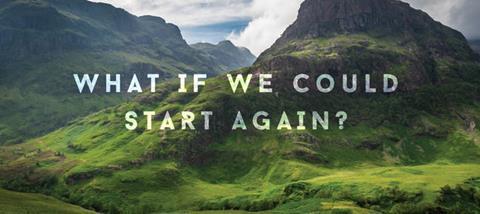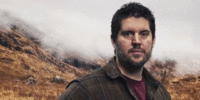
What if we could start again? That’s the question Channel 4’s programme Eden attempted to answer this year. In March 2016, the programme sent 23 willing volunteers to a stretch of fenced-off shoreline in the Scottish Highlands. They were going to be cut off from the outside world for an entire year and tasked with building a new community from scratch. Fortyseven cameras were rigged around the camp, and four camera operators were embedded inside the community to capture events as they unfolded. Unlike other reality TV contests, there were no tasks, eliminations or prizes. This experiment was about creating a new utopia.
It didn’t go well. But the Edenites were not set up for failure. They were given rations for the first 100 days, natural resources including livestock and basic tools to build shelters. The producers had handpicked skilled participants. A builder, soldier, plumber, vet, deerstalker, army officer, paramedic, chef, shepherdess, horticulturalist and even a life coach all entered Eden.
Initially things went OK. Despite having no access to running water or electricity, the team managed to construct a working hot shower. Soon they were catching fish and tending to their own vegetable patch. They even managed to make moonshine and haggis and build a teepee. But a camping trip where everyone gets on with each other makes for boring TV. As the first four episodes of Eden were broadcast in the summer of 2016, ratings quickly plummeted.
After only a handful of episodes, Eden was quietly and mysteriously dropped from the TV schedules. As time dragged on, and rumours circulated about what could possibly be happening inside the camp, the press picked up on the story. How could Channel 4 have left these poor people under the impression they were being filmed for national TV when no one had been watching them for months? The broadcaster responded by assuring viewers the remaining episodes would be shown...eventually. True to their word, Channel 4 finally broadcast Eden: Paradise Lost in August this year (see trailer below). And, as the show’s new name suggests, it showed all hell breaking loose.
The fall
Twenty-three men and women entered Eden but only eleven endured the whole year as planned. Near-constant arguing, fighting and bullying ripped the camp apart. Many left. Some of those who stayed paid a heavy price – even battling serious mental health problems.
Tara the life coach was the first to walk out after the group made their feelings known about perceiving her as lazy. Soon afterwards, Glen threw in the towel. The deer hunter had failed to shoot a single animal and felt like a failure. But after enjoying a hearty meal at a local pub (and encouraged by the producers), Glen changed his mind and walked back in.
Rather than being welcomed back, the group were angry that he’d been allowed to change his mind, and staged a walkout. The producers had a mutiny on their hands as the participants escaped, flagged down a car and borrowed a phone to contact their families. After much begging from the production team, they all agreed to go back in, including Glen, who finally managed to shoot a deer for the near-starving community and found himself very much forgiven.
In the meantime, Anton – a 42-year-old boatman – became increasingly difficult to live with. He withdrew from the community and built his own log cabin in the woods, quickly becoming a villain in their eyes. At times he was his own worst enemy. At other moments, he was the victim of bullying, often reduced to tears by the cruelty of others. Eventually he found a friend in Raph, and the two men took materials from the main camp to extend their cabin. They even managed to construct a sauna!
The life of comparative luxury that Anton and Raph were enjoying began to grate on the rest of the participants. They hatched a plan to goad Anton into lashing out at another contestant, Rob, which would allow them to remove him. The plan worked and, after a violent and prolonged altercation, they voted to remove Anton. His faithful friend Raph declared, “If he’s going, I’m going.” But, before leaving, the pair engaged in a final act of revenge and burned down their beautiful log cabin, rendering it useless for the remaining Edenites.
Once they were on the other side of the fence, the producers reminded the happy duo that in order for a vote to carry in Eden, 75 per cent of participants must be agreed. If the pair had voted (as they were entitled to), the result would have fallen short of the required majority. Anton and Raph were distraught – they had literally burned their bridges so had nothing to return to. “They’ve stolen this from me!” cried Anton.
The main players
Anton
Adventurer, rowing coach and boatman. He quickly became a loner, living first by himself in the woods and later joined by Raph.
Raph
Age 55, the oldest member of Eden was a gifted carpenter who got on with most people and was often the voice of reason.
Katie
A tough forager who made it to the bitter end, enduring huge emotional turmoil in the process.
Rob
A sensitive and introverted vet and Katie’s boyfriend.
Glen
The man responsible for hunting deer. One of The Valley Boys.
Male and female enmity
Halfway through the year-long experiment another split took place, this time between boys and girls. Early on, Titch the plumber had suggested the men should do ‘manly’ jobs they were better suited to, such as chopping wood, fishing and building.
Eden’s female participants noted that as more women left the experiment, so the remaining men became cruder and more misogynistic. Like the defence employed by Trump to the outside world when he justified his own lewd comments as “locker room talk”, the boys passed off their remarks (too crude to print) as mere jokes and banter. The girls didn’t see it that way.
In time, five of the men left the main camp to form their own community in the woods, fed up of sharing food and resources with ‘weaker’ (ie female) members of Eden. Artist and marine conservationist Katie commented, “You can feel the hostility and tension when you’re with [them] and what a burden we are. It’s not a nice feeling to live with.”
Katie’s boyfriend, Rob the vet, also became increasingly upset with this breakaway group who dubbed themselves The Valley Boys as they embarked on a meat-only diet, slaughtering animal after animal.
As the remains of deer, sheep and pig littered The Valley Boys’ camp, the smell of rotting flesh intensified. Rob couldn’t stand it anymore so wandered off in the dead of night. When the production team found him nine miles away, Rob explained through tears and expletives: “I don’t want to see every animal get shot in the face just to feed a bunch of greedy people.” He left the experiment.
Katie was distraught. Her relationship with Rob had been described by other members of the community as “serious and intense”. Rob had left without saying goodbye but grief quickly turned to anger as Katie blamed The Valley Boys for pushing her boyfriend to breaking point.
As Christmas rolled around, Katie stayed inside the log cabin she and Rob had built together. Ignoring the celebrations, she turned to drinking heavily. By this point, contraband in the form of tobacco, alcohol and chocolate was flowing freely into Eden. Yet another indication the experiment was going seriously wrong.
Leaving Eden
As the experiment entered its final days, the two tribes met together one last time, trying to put their differences aside and return to being one single community, as originally intended. The party was in full swing, until Katie piped up with the fatal words “I don’t want this to cause an argument but…” and raised grievances over a stolen package of contraband. Within seconds, everyone was screaming at one other.
Watching Eden: Paradise Lost may not reveal the full story of what really took place in Scotland. Boiling down one year’s worth of footage into a few hours means a lot of footage has been left on the cutting-room floor. As participants have since spoken out in the media, all kinds of accusations have flown around, including that the show descended into an environment akin to Lord of the Flies.
Rachel, a 29-year-old horticulturalist, had a breakdown inside Eden, imagining she would be caught by the police and brought back if she attempted to leave. None of this was even hinted at in the final edit of Eden: Paradise Lost. In fact the show fails to explain why most participants left at all.
When the experiment ended in March this year, the eleven surviving participants were removed from the camp and shown newsreel of the year they’d missed. As they discovered the result of both the UK vote on Brexit and the USA’s election of Trump, participants became philosophical about the intensity of feeling on all sides of these political divides. Glen later told The New Yorker he wondered if the division inside Eden had expressed something fundamental about the way that humans live together: “It is binary. You are either in one camp or the other. It is us and them. Things tribalise.”
The original sin
Reflecting on the project, Channel 4’s commissioning editor Ian Dunkley told The Guardian: “I don’t think anyone expected it to go as feral and dark as it did.”
Perhaps Dunkley’s view of human nature was naively optimistic. From the 20th century’s experiments with communism to today’s humanist idealism, history is littered with failed attempts to create paradise. It only proves that there is something corrupt at the heart of the human condition, and it stems from the original Eden.
One of the effects of sin entering our world was a breakdown in human relationships, and between men and women specifically as God says to Eve: “Your desire will be for your husband, and he will rule over you” (Genesis 3:16). The sexism and gendered power struggle between men and women which was played out so clearly on our TV screens is ultimately a result of that first Fall. So too was the uncaring, survival of the fittest ‘if you can’t hunt you don’t deserve to eat’ attitude adopted by some of the men. Glen, one of The Valley Boys, defended himself by stating: “It’s just how humans are”. Maybe so, but the good news of Christianity is that God didn’t leave us that way. We all need a new nature to replace our fallen humanity. And only Christ can offer that kind of new creation. Both the biblical and modern Eden were supposed to be paradise. Instead, we humans ruined it. God knows we can’t go back to the garden. What’s done is done. We won’t create a utopia or a new Eden by ourselves. But God will.
Click here to request a free copy of Premier Christianity magazine




































